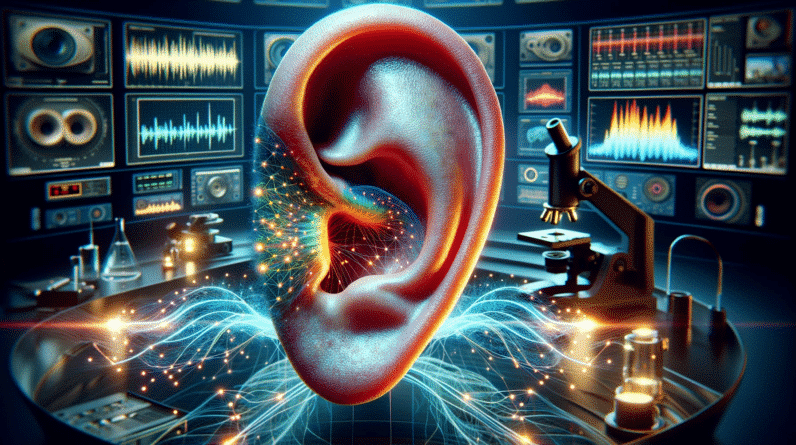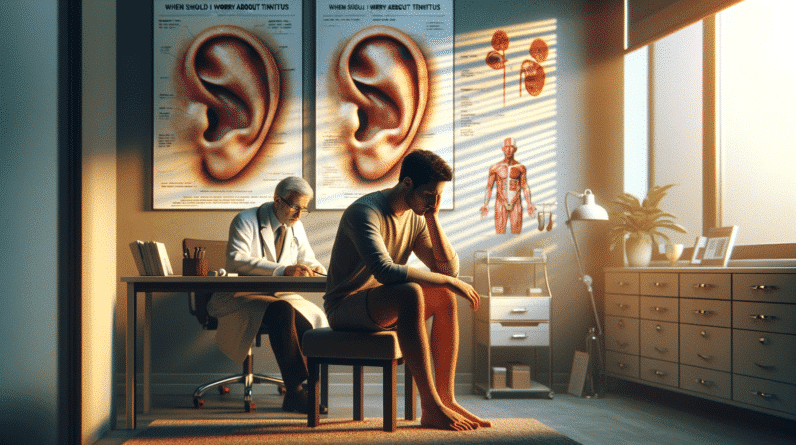
We may earn money or products from the companies mentioned in this post.
As an Amazon Associate I earn from qualifying purchases.
If you’ve ever experienced a constant ringing, buzzing or humming sound in your ears, then you’ve experienced what is known as tinnitus. Although tinnitus isn’t a disease itself, it’s a symptom of an underlying condition. We will dive deep into understanding more about tinnitus, highlighting what causes it, its impact and how it can be managed effectively.
The Basics of Tinnitus and Its Impact
What is Tinnitus?
Tinnitus is a common problem affecting about 15% to 20% of people worldwide. It is the perception of noise or ringing in the ears, often described as a ring, hiss, or click when no external sound is present. It’s not a disease itself, but a symptom resulting from many possible causes, such as ear injury or a circulatory system disorder, highlighting the importance of understanding tinnitus.
The Prevalence and Impact of Tinnitus
Is Tinnitus common, you ask? Well, tinnitus affects people of all ages, races, and genders, impacting the quality of life. According to the American Tinnitus Association, about 15-20% of people are estimated to be affected by tinnitus at some point in their lives. The condition can come and go, or it might be a permanent fixture in your life. From a mere annoyance to a debilitating condition, tinnitus prevalence and its impact on an individual’s daily life are much more comprehensive than we often acknowledge.
In summary, understanding the basic concept of tinnitus is the first step in addressing the condition. Understanding its causes sets a solid ground for effective management and, if possible, prevention. Besides, acknowledging its widespread prevalence reminds anyone struggling with tinnitus that they are not alone, and support and solutions are available.
Evidently, tinnitus is a common issue affecting many people across the world. But what exactly causes this incessant ear noise? Let’s delve deeper into the main causes of ear tinnitus.
Main Causes of Ear Tinnitus
The causes of tinnitus are many and varied. They range from natural factors such as age and noise exposure to lifestyle choices and medical conditions. Let’s break them down:
Natural Factors that Cause Tinnitus
Did you know that aging and exposure to loud noise are major natural contributors to tinnitus?
Age: As we age, there is a normal wear and tear of our ears, often leading to tinnitus. Research states that tinnitus often increases with age, evident by the fact that adults above 60 often report tinnitus cases. You can learn more about this on our age-related tinnitus webpage.
Sound Exposure: Continual or one-off exposure to very loud sounds often cause tinnitus. So, whether it’s from attending many music concerts, working in noisy environments, or listening to music through earbuds at high volumes, you may unknowingly trigger tinnitus. Does this kind of tinnitus go away? Find out more in our discussion on noise-induced tinnitus.
Medical Conditions Related to Tinnitus
Several health factors may also contribute to tinnitus. Let’s take a look at a few:
Ear and Hearing Issues: Certain conditions like ear infections, earwax blockage, or changes in the ear bone can cause tinnitus. Notably, ear problems are among the common causes of tinnitus.
Neurological and Blood Flow Problems: Some neurological diseases like multiple sclerosis and migraines can cause tinnitus. Furthermore, conditions that affect your blood flow such as high blood pressure or atherosclerosis often cause pulsatile tinnitus, a type of tinnitus that sounds like a pulsing or throbbing in your ears. Get in-depth details about this on our page covering tinnitus nerve damage.
Lifestyle Triggers and Tinnitus
Lastly, let’s not rule out the tinnitus effects that come from our lifestyle. Factors like stress and our dietary habits make a big difference.
Stress: It can’t be emphasized enough how much our stress levels can negatively impact our health. Interestingly, there is a link between high stress or tension levels and tinnitus. Take a breather and learn more on our article about tension headache tinnitus.
Diet and Habits: In some cases, what we consume might trigger or worsen tinnitus. For instance, reports indicate that drinking alcohol, especially red wine, could make tinnitus symptoms more noticeable. More about this can be found on our red wine tinnitus page.
In conclusion, tinnitus results from a multifaceted blend of natural, medical, and lifestyle factors. Learning to discern what issues could contribute to your tinnitus can help you better manage and hopefully mitigate the symptoms. It considerably minimizes any chance for it becoming a permanent fixture in your life.
Natural Factors that Cause Tinnitus
Some of the leading factors that can result in tinnitus are entirely natural and, in most cases, unavoidable. They include:
Age and Tinnitus
As we grow older, our bodies undergo a series of changes, and unfortunately, our ears are not spared. Age-related hearing loss, also known as presbycusis, often starts around the age of 60. This gradual loss of hearing can lead to tinnitus. Check out our page on age-related tinnitus for more insightful information.
Sound Exposure and Tinnitus
Exposure to loud noise is another common cause of tinnitus. Whether it’s working on a construction site, attending numerous loud concerts, or even blasting music through your headphones, such activities can lead to noise-induced hearing loss and subsequently, tinnitus. You might be wondering, does this type of tinnitus go away? We delve deeper into this topic in our article on noise-induced tinnitus.
Medical Conditions Related to Tinnitus
Various medical conditions can also lead to tinnitus. Some of these are:
Ear and Hearing Issues that Cause Tinnitus
Certain conditions tied to hearing health can trigger tinnitus. For instance, an ear infection can cause temporary tinnitus that goes away upon treatment. Similarly, earwax blockage or changes in the middle ear’s bones can also lead to this ringing in the ears. For a detailed discussion, visit our ear cause tinnitus post.
Neurological and Blood Flow Problems
Specific conditions that affect your blood flow, such as atherosclerosis or high blood pressure, can lead to pulsatile tinnitus, a type of tinnitus that sounds like a pulsing or throbbing in your ears. Some neurological disorders, like migraines or multiple sclerosis, might also trigger tinnitus. Check out our blog about tinnitus and nerve damage to learn more.
Lifestyle Triggers and Tinnitus
Interestingly, your lifestyle choices can also affect whether you develop tinnitus. Some of the contributing factors include:
Stress and Tinnitus
There’s a clear link between high stress or anxiety levels and tinnitus. In some cases, stress doesn’t directly cause tinnitus but worsens it. Discover more about this on our page about tension headache and tinnitus.
Diet and Habits
Did you know that what you eat or drink could trigger or worsen tinnitus? For example, alcohol and especially red wine can sometimes make tinnitus more noticeable. Similarly, high caffeine intake or smoking can increase tinnitus symptoms. Read more about this on our red wine and tinnitus page.
Identifying Symptoms and Diagnosis for Tinnitus
Are you constantly hearing a buzzing or ringing within your ears? Well, you might be experiencing tinnitus. But how can you be sure? Recognizing the symptoms and seeking a proper diagnosis is a vital starting point.
Recognizing the Signs
Tinnitus symptoms vary widely, depending on the individual and the underlying causes. Mostly, it manifests through phantom noises in your ear, including ringing, buzzing, roaring, clicking, hissing, or even whistling. You may experience these sounds continuously or intermittently, and they can occur in one or both ears. Believe it or not, for some people, the intensity of these sounds can be so high that it interferes with their ability to concentrate or hear actual external sounds. Remember, these tinnitus-related noises are only audible to you and not other people around you.
Does it sound a lot like what you are experiencing? It might be time to seek medical attention. You can learn more about the signs of tinnitus on our symptoms for tinnitus page.
Diagnostic Tests
When it comes to diagnosing tinnitus, doctors and audiologists have several tests and tools at disposal. First, a doctor will examine your ears, head and neck to check for possible external sources of the sounds. This might include checking your ear canals for wax build-up or an ear infection. A hearing test is usually the first step in diagnosing tinnitus. More specific tests such as the audiological exam or imaging tests like CT scans or MRIs might be necessary to identify structural or neurological causes of tinnitus. For a further in-depth look into how tinnitus is diagnosed, head over to our page on tests for tinnitus.
Treatment and Management Approaches for Tinnitus
Knowing that you have tinnitus can be jarring (no pun intended). However, note that numerous treatment and management strategies can help you cope with this condition effectively.
Treatment options for tinnitus largely depend on the underlying causes. For instance, if your tinnitus is caused by earwax build-up, removing the wax might reduce the symptoms. Similarly, if it’s due to a blood vessel condition, treating the vascular issue may cure your tinnitus.
Medical treatments such as specially designed acoustic signals (delivered through hearing aids) provide a significant reduction in tinnitus severity. Therapy options include cognitive-behavioral therapy (CBT), mindfulness-based stress reduction, tinnitus retraining therapy, and more. You might also be recommended certain lifestyle changes—like reducing caffeine intake, adding physical exercise, or practicing relaxation techniques—to improve your symptoms.
Medication and Therapy Medication and Therapy for Tinnitus
From over-the-counter options like Lipo-Flavonoid to prescribed medications, there are many pharmacological ways to tackle tinnitus. Specially designed acoustic signals delivered through hearing aids also provide a significant reduction in tinnitus severity. Collaborate with your healthcare professional to find the best course of action for you.
Lifestyle Adjustments Improving Lifestyle for Tinnitus Management
Your habits shape your health. Tinnitus is no different. Small changes, such as reducing caffeine intake, quitting smoking, incorporating regular exercise, and practicing relaxation techniques, can greatly alleviate tinnitus symptoms and improve your overall life expectancy.
Alternative Treatments Exploring Alternative Treatments for Tinnitus
Have you thought about using marijuana for tinnitus treatment? While still controversial, some patients swear by the relief it provides. Always consult with a healthcare provider before embarking on such treatments.
Long-term outlook for Tinnitus Sufferers
Looking ahead, what does the future hold for those with tinnitus? Though it may feel life-altering, there’s much room for optimism, thanks largely to numerous advancements in research and medicine.
Prognosis and Ongoing Research Unfolding the Future of Tinnitus
The research around tinnitus and its treatments are rapid and ongoing. From exploring new medical drugs to trialing innovative therapies, the search for the ultimate tinnitus remedy continues. Medical professionals are relentlessly working to better understand this complex condition and develop effective treatment strategies. Learn more about the exciting advancements in our tinnitus prognosis section.
In Conclusion: Understanding Tinnitus is Key
In the quest to manage tinnitus, understanding is an invaluable tool. By knowing the causes, recognizing the symptoms, getting a proper diagnosis, and exploring various treatments, we can move towards a life less dominated by the incessant sounds of tinnitus. Awareness and education, after all, are our best defenses.
Remember, while there is no definitive cure for tinnitus right now, the goal should always be focused on improving your quality of life and managing symptoms efficiently. Don’t let tinnitus define you. Take control, seek help, make informed decisions, and continue living out your life’s melody!
What Causes Ear Tinnitus - Frequently Asked Questions (FAQ)
Tinnitus often sounds like a ringing in the ears, but it can also be a whistling, buzzing, humming, clicking, hissing, or roaring sound. The sound can fluctuate in volume and may only be noticeable in a quiet setting or may be loud enough to interfere with daily activities.
For more detailed information, click here to check our related article.
Yes, high levels of stress can contribute to the onset or worsening of tinnitus. Stress can indirectly affect your hearing, causing you to perceive tinnitus symptoms more acutely. It is not usually the sole cause of tinnitus, but it can exacerbate the condition. For more on this, check out our article on tension headache and tinnitus.
Yes, certain dietary choices can exacerbate tinnitus. Alcohol, especially red wine, as well as high caffeine intake or nicotine use can increase tinnitus symptoms. You can learn more on our red wine tinnitus page.
Several medical conditions can lead to tinnitus such as high blood pressure, atherosclerosis, diabetes, anemia, thyroid conditions, autoimmune diseases, and more. Specific ear disorders can also cause tinnitus. Read more about these connections on our conditions that cause tinnitus page.
In many cases, tinnitus may resolve on its own, especially if it’s caused by a short-term condition such as an ear infection or exposure to loud noise. However, for chronic tinnitus sufferers, the noise might not disappear completely, but there are ways to manage it. Find out more from our post does tinnitus go away.
Amazon and the Amazon logo are trademarks of Amazon.com, Inc, or its affiliates.






35 Comments